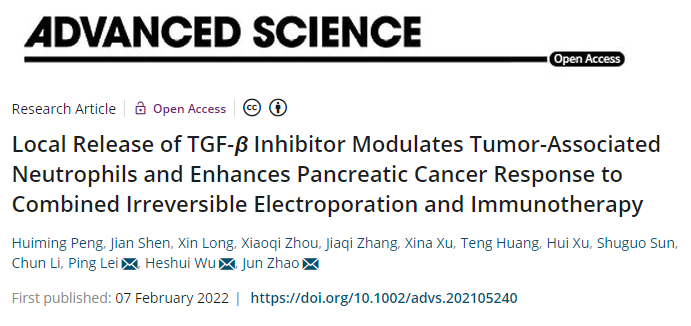On February 7, 2022, the team of Prof. ZHAO Jun from the Department of Anatomy, Basic Medical College of Tongji Medical College of Huazhong University of Science and Technology, published an online article in "Advanced Science" entitled "Local Release of TGF-beta; Inhibitor Modulates Tumor-Associated Neutrophils and Enhances Pancreatic Cancer Response to Combined Irreversible Electroporation and Immunotherapy".

Pancreatic cancer is known as the king of cancer, and it is urgent to develop effective treatments. Irreversible electroporation ablation (IRE), also known as nano-knife, is a new type of minimally invasive interventional therapy, which releases high-voltage electrical pulses by inserting needle electrodes into tumors to kill cancer cells. In recent years, the strategy of IRE combined with immunotherapy has been approved highly effective in animal experiments and clinical trials, but tumor recurrence after IRE is still a difficult problem.
In a mouse pancreatic cancer model, Prof. ZHAO Jun's team found that a large number of neutrophils infiltrated the tumor after IRE, and polarized into a tumor-promoting N2 phenotype under the action of intratumoral TGF-beta, which is unfavorable for prognosis. The use of biodegradable mesoporous silicon nano-drug-loading platform could achieve sustained intratumoral release of TGF-β inhibitors can promote the transformation of neutrophils to tumor suppressor N1 phenotype, and significantly enhance pancreatic response to IRE combined with PD1 monoclonal antibody. This study provides a new perspective for solving the immunotherapy-resistance pancreatic cancer in clinical practice.
